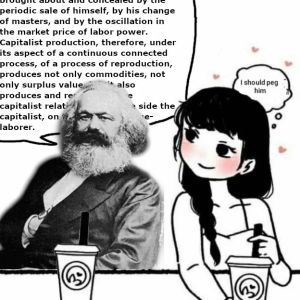Communism

This article talks about Communism from a Gen Z perspective.
Remember when people said you are a communist in college then you become a capitalist when you get older? This is the generation that will reverse that...
Zoomers and the Workplace: A Generation Redefining Work Values in the Post-Covid Era
The traditional narrative of young adults embracing communist ideals in college only to morph into staunch capitalists as they age may be shifting. The "Zoomers", the generation born between the late 1990s and early 2010s, are challenging this conventional trajectory.

On one hand, many Zoomers exhibit a strong affinity for communal values, advocating for shared resources, equitable distribution of wealth, and a focus on collective well-being. This is evident in their support for initiatives like universal basic income, affordable housing, and accessible healthcare. They believe in a "fair share" for everyone, emphasizing collaboration over cutthroat competition.
However, there's another side to this generation. Zoomers are also known for their entrepreneurial spirit and individualistic drive. Many are not content with settling for a fixed salary and crave the opportunity to earn based on their performance and contributions. They value autonomy, flexibility, and the ability to carve their own path in the workplace.
The COVID-19 pandemic has further amplified this generational shift. The rise of remote work and the "Great Resignation" have given employees more leverage than ever before. Zoomers, in particular, are not afraid to negotiate for better pay, benefits, and work-life balance.
The so-called "employee shortage" that has emerged in the post-Covid era is not necessarily a lack of available workers. Rather, it's a reflection of a changing workforce that demands more from their employers. Many Zoomers are unwilling to settle for low wages and poor working conditions, opting instead to pursue alternative career paths or start their own businesses.

This shift in power dynamics is challenging traditional corporate structures and forcing companies to adapt. The Zoomers' desire for flexibility, autonomy, and fair compensation is reshaping the workplace landscape.
However, not all Zoomers share the same values. Some are content with a stable job and a fixed salary, while others are driven by ambition and a desire for financial success. This diversity of perspectives creates a complex and dynamic workforce, one that is constantly evolving and challenging the status quo.
In conclusion, the Zoomers are a generation that defies easy categorization. They embrace both communal values and individualistic aspirations, demanding a workplace that offers both fairness and opportunity. The post-Covid era has further amplified this generational shift, empowering workers to demand more from their employers. As the Zoomers continue to enter the workforce, their impact on the future of work will be profound and far-reaching.
Interests by Gen Z
Why Gen Z Is Taking an Interest in Communism: A Deep Dive into Disillusionment and Ideals
Communism, a word that for decades carried heavy connotations of Cold War fears and dystopian regimes, is now gaining unexpected traction among younger generations—particularly Gen Z. Why is this happening? It’s a confluence of factors, ranging from capitalism’s visible flaws to the allure of a seemingly fairer system. However, the picture isn’t as radical as it might seem. Let’s unpack the reasons behind this shift.
1. Capitalism’s Cracks Are Showing
For Gen Z, the flaws of capitalism aren’t just an abstract concept—they’re lived experiences.
- Widening Wealth Gaps: The richest individuals continue to amass fortunes while housing, education, and healthcare become increasingly unaffordable.
- Economic Precarity: Many Gen Zers entered adulthood during economic instability, with rising student debt, stagnant wages, and an uncertain job market.
- Environmental Degradation: Unchecked capitalism is often blamed for the climate crisis, with corporations prioritizing profits over sustainability.
These issues lead to a natural reaction: questioning the system that allowed such inequities to thrive. However, rather than advocating incremental reforms, some are drawn to the idea of scrapping the system altogether in favor of something new—or at least, dramatically different.
2. The Appeal of Simplicity: All or Nothing
Humans are not always great at nuance. Many Gen Zers see the flaws of capitalism and conclude that the only solution is its polar opposite.
- Binary Thinking: It’s easier to think in extremes: “If capitalism is bad, then communism must be good.”
- Frustration with Incremental Change: Slow progress and political gridlock make radical alternatives more appealing to those who feel urgent problems require immediate action.
This doesn’t mean everyone wants to abolish private property overnight. Rather, it reflects a broader impatience with systems perceived to prioritize corporations over people.
3. The Utopian Promise of Communism
On paper, communism offers a tantalizing vision:
- Equality for All: No more billionaires hoarding wealth while others struggle to survive.
- Abolition of Exploitation: Workers keep the full value of their labor instead of enriching their employers.
- Cooperation Over Competition: A system where collective well-being matters more than individual profit.
Even those who reject communism often acknowledge that its core ideas sound appealing in theory. The trouble, of course, lies in implementation—a detail often overlooked in idealistic discussions.
4. Misunderstandings of Political Terms
Many young people conflate communism, socialism, and other leftist ideologies.
- Socialism ≠ Communism: Socialism focuses on social ownership and regulation of key industries, while communism calls for the abolition of private property.
- Social Democracy vs. Democratic Socialism: Countries like Sweden and Denmark practice social democracy, blending capitalism with strong welfare systems—not socialism as some believe.
- Mislabeling Policies: Programs like universal healthcare or free college are often branded as “socialist,” muddying the waters further.
These misunderstandings can lead to the perception that Gen Z is embracing communism when, in reality, many simply want a more equitable version of capitalism.
5. A Generous View of Human Nature
Communism relies on the idea that people will act altruistically for the common good. Some Gen Zers are optimistic—or naïve—enough to believe this could work.
- Distrust of Institutions, Not People: Many young people distrust corporations and governments but remain hopeful about grassroots movements and mutual aid.
- Idealism vs. Pragmatism: They often believe society could function cooperatively if systemic barriers were removed, despite historical evidence to the contrary.
This faith in humanity can be admirable, but it also glosses over the challenges of greed, corruption, and the need for incentives in complex economies.
6. Most Don’t Want Communism—They Want Reform
Despite the headlines, the majority of Gen Z isn’t advocating for full-blown communism. They’re calling for:
- Addressing Inequality: Fairer tax policies, higher wages, and access to basic necessities.
- Government Accountability: Policies that prioritize people over corporations.
- Systemic Improvements: Reforming capitalism to make it more humane and sustainable.
What Gen Z desires isn’t a dictatorship of the proletariat—it’s a system that works for everyone.
The Bottom Line
Gen Z’s interest in communism is less about a genuine desire to overthrow capitalism and more about a rejection of the status quo. For many, communism isn’t the ultimate goal; it’s a symbol of dissatisfaction and a way to imagine a better future.
Critics might dismiss their views as idealistic or uninformed, but their concerns highlight real flaws in the system. Whether through radical transformation or incremental reform, the message is clear: Gen Z wants change. The real question is whether society will listen.
